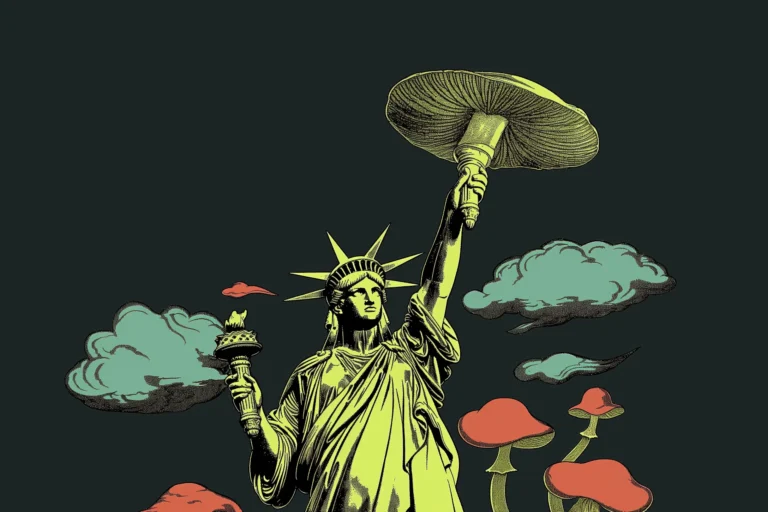In this week’s news roundup, Rick Doblin is named to Time Magazine’s Top 100, an orangutan uses medicinal plants to heal, and more.
Rick Doblin Named to Time 100 Health Influencers
MDMA legend and MAPS founder Rick Doblin has been named to Time Magazine’s 100 most influential people in health.
In 1986, Doblin founded the Multidisciplinary Association for Psychedelic Studies (MAPS) with the goal of showing the government and medical world that MDMA is a compound with healing potential worthy of study and not legal prohibition.
With MAPS being one of the most well-known institutions in psychedelic medicine, many psychonauts are likely familiar with Rick Doblin, but having him honored by a major publication like Time Magazine shows just how far psychedelics have come in terms of mainstream acceptance.
Keep Up with Psychedelic Trends
Don’t miss the latest psychedelic news, events, companies, and more.
We respect and protect your privacy. By subscribing your info will be subject to our privacy policy. Unsubscribe easily at any time
With the U.S. Food and Drug Administration (FDA) set to potentially approve MDMA as a treatment for PTSD, decades of hard work may finally be coming to fruition. As quoted in the Times article: “I feel incredibly lucky to see the change that I’ve been working for happen in my own lifetime,” said Doblin. “I can die happy, whenever that comes around.” (1)
Plant Medicine Activists Help Stop Colorado Social Media Bill

Senate Bill 24-158, a proposed legislation aiming to modify social media usage among youths, was withdrawn on Wednesday following significant opposition from various groups. The bill had intended to enforce age verification on social media platforms, establish protective default settings for minors, and equip parents with tools to restrict access.
The bill’s proponents believed these measures would shield minors from sexual predators and prevent them from accessing harmful materials such as drugs and weapons online.
But plant medicine activists in Colorado believed it would hurt legal access to compounds like psilocybin. A major point of contention was the bill’s potential impact on discussions regarding natural psychedelic medicines, which have been decriminalized in Colorado.
Advocates for these substances argued that the bill would inhibit Coloradans from sharing information about such drugs on social media. As reported by Fox News KDVR in Colorado, concern was particularly significant for local businesses centered around plant medicine, which could face restrictions on their social media activities related to psychedelics. Additionally, the bill would have prohibited social media content related to certain controlled substances, consumable hemp products, extending its reach beyond just protecting minors. This led to a protest at the Capitol shortly before the committee hearing, where enthusiasts of natural medicine urged lawmakers to oppose the bill.(2)
Their efforts seemed to have worked as the bill, in its current form, has been withdrawn.
Keep Up with Psychedelic Trends
Don’t miss the latest psychedelic news, events, companies, and more.
We respect and protect your privacy. By subscribing your info will be subject to our privacy policy. Unsubscribe easily at any time
Reunion Neuroscience Secures $103 Million Series A Financing

Reunion Neuroscience has successfully secured $103 million in Series A financing to advance its clinical-stage psychedelic drug candidate, RE104.
Reunion Neuroscience is the biotech spinoff of the now defunct Field Trip Health. The company was created to focus on drug development, primarily for lead candidate RE104. The funding round was co-led by MPM BioImpact and Novo Holdings and included contributions from Mitsui & Co. Global Investment, Plaisance Capital, FemHealth Ventures, and Palo Santo. This capital injection will support the “RECONNECT” Phase 2 clinical trial of RE104 in treating postpartum depression (PPD).
RE104 is a patented prodrug of 4-OH-DiPT and acts on the serotonin 2A receptor (5HT2AR), known for its role in the antidepressant effects of psychedelics. Unlike typical psychedelics such as psilocybin, which require extensive in-clinic monitoring, RE104 is designed to deliver a shorter, approximately half-day, psychedelic experience. This aspect could potentially make it a more scalable option for clinical use. In its initial Phase I studies, RE104 not only demonstrated a safety profile comparable to psilocybin but also induced a similar psychoactive state, though for half the duration (3-4 hours).
The upcoming RECONNECT Trial is a Phase II trial, set to begin patient enrollment this quarter. The trial aims to evaluate the efficacy of RE104 in patients with moderate to severe postpartum depression, with results anticipated by the second quarter of 2025.
With the failure of Field Trip and the extended market downturn, this large capital raise comes as a pleasant surprise to investors and analysts, potentially signaling a slow return of investor confidence to the psychedelics medicine space.(3)
Orangutan Uses Medicinal Plants to Self-Medicate

While not strictly considered psychedelic news, we do have a remarkable story from the world of medicinal plants. Documented in a study published in Nature, a wild orangutan was observed self-medicating with plants containing medicinal properties. The primate known as Rakus utilized the Akar Kuning plant to treat a wound. Days after sustaining an injury, Rakus was observed selecting and chewing the leaves of this vine for approximately thirty minutes. He then applied the juice extracted from the plant directly onto his wound and subsequently placed more solid plant material over the area, effectively creating a natural plaster.
The Akar Kuning vine is prevalent in East and Southeast Asia, and is recognized among Indigenous Sumatran communities for its antibacterial, anti-inflammatory, antifungal, and analgesic properties. It is even used to alleviate symptoms of malaria.
In the days following this treatment, Rakus increased his rest periods, spending about half of his time sleeping, a behavior change that likely supported his recovery. Impressively, the wound healed completely within a few days without signs of infection.
This observation provides interesting insight into the intuitive use of natural remedies in wildlife. What’s next? Ayahuasca ceremonies? (4)
Sources

1. Time Magazine (2024). Rick Doblin, Redefining psychedelics. https://time.com/6968396/rick-doblin/
2. Fox News 31 (2024). Psychedelics advocates to march against Colorado social media bill. https://kdvr.com/news/politics/psychedelics-advocates-push-back-on-colorado-social-media-bill/
3. Yahoo News (2024). Reunion Neuroscience Inc. Announces $103 Million Series A Financing Co-Led by MPM BioImpact and Novo Holdings. https://finance.yahoo.com/news/reunion-neuroscience-inc-announces-103-103000336.html
4. Laumer, I.B., Rahman, A., Rahmaeti, T. et al (2024). Active self-treatment of a facial wound with a biologically active plant by a male Sumatran orangutan. Nature. https://www.nature.com/articles/s41598-024-58988-7
This material is not intended as a replacement or substitute for any legal or medical advice. Always consult a medical professional about your health needs. Psychedelics are widely illegal in the United States, and readers should always be informed about local, state, and federal regulations regarding psychedelics or other drugs.

 Jason Najum
Jason Najum



 Ross Dillon
Ross Dillon 
 David Connell
David Connell